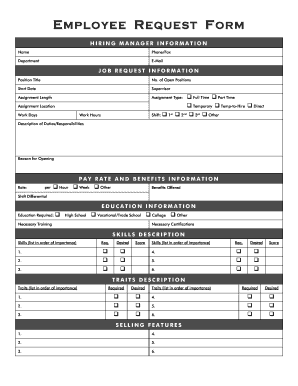How to ask your boss for a day off? Is it time to update your employee time-off policy? Can an employer deny time off? Can my employer deny my request for time-off to?
More often than not, employees are left wondering how, where, and when to request time - off from their managers. Sometimes employees will have sudden time off requests, usually due to some unexpected and important events. Depending on the severity of the reason, all efforts should be made to approve the request. In any case, if the time off request isn’t grante there is a good chance that the employee will just take a sick day anyway.
Having one employee tell you directly about an upcoming time-off request, while another employee scribbles their request on a piece of scrap paper, is a recipe for confusion. To make the time-off request process as standardized as possible, create a form that everyone will use. The time that is not covered by the PTO policy , and for which separate guidelines and policies exist, include company paid holidays, bereavement time off , required jury duty, and military service leave.
Every employee needs some time off , but recurring absenteeism can disrupt a business. It’s important to know how to manage requests in a timely and effective manner. Be sure to have any policy you formulate reviewed by an attorney — there are a few areas.
SAMPLE TIME OFF REQUEST POLICY AND PROCEDURES POLICY : ! Time off should be requested at least two weeks in advance of the requested day(s) off. Employee PTO policy sample. Creating a policy that is clear and all employees understand is the goal.

So, where do you start? Answer these questions to get a time off policy started: Who’s eligible for time off? The first policy below is a general use policy that can be easily adapted to address most offices.
Also included is a policy based on a maximum accrual, and a policy based on annual accrual. It is the policy of ABC Company to provide each full- time employee with vacation time on a periodic basis. For most HR practitioners, trying to coordinate a pile of time - off requests for the upcoming holiday season is hardly your favorite part of the job. No one really wants to be the one to tell employees that their request to spend time with their families during the holidays is being rejecte but depending on a whole slew of factors—industry, company size, production schedules, client demands. Though employees need to have time away from work for a variety of reasons, you’re faced with the challenge of striking a perfect balance between approving requests and maintaining productivity in the workplace.
When an employee is taking too much time off at once. If a time - off request is long enough that you’re not sure whether or not it qualifies as a leave of absence, you probably need to talk. However, during any one fiscal year, an employee will not normally be granted more than a total of ten (10) days of Unpaid Time Off. This policy applies to all sworn and non-sworn employees. Department employees will earn and use time off as prescribed by the Fair Labor Standards Act (FLSA), state law, city ordinance, city personnel rules, collective bargaining agreement and any other lawful agreement.
Use this form to organize and document these requests so management spends less time in the process and employees get fair and timely treatment. However, it’s your busiest season and you can only grant one employee ’s request. UO has a variety of strong, employee - and family-friendly policies relating to time away from the workplace.
Laying out an unambiguous time - off policy will help alleviate employees’ fears that their vacation requests could make them seem “less dedicated. Each employee ’s vacation time is theirs, after all. Doing this also communicates a level of professionalism that is often rare among smaller teams.
No comments:
Post a Comment
Note: Only a member of this blog may post a comment.